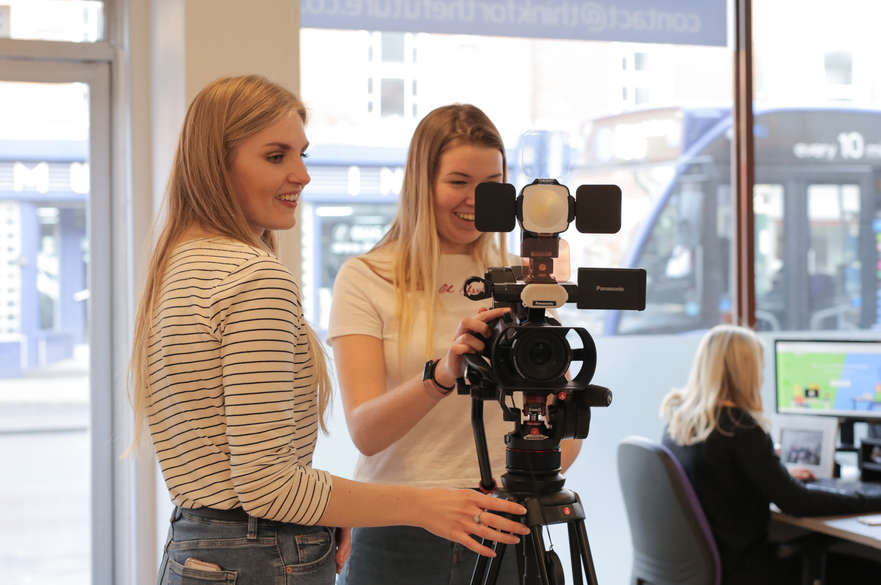This course is in Clearing
Offers from 80 tariff points
About this course
Throughout the ages, the written word has been a powerful force for political action, historical documentary, creative expression and transformation. At NTU, we share your passion for English, and on this degree we bring this passion to enhancing, interrogating, and challenging your understanding, while also developing your talents and strengths.
Why Study English at NTU?
English at Nottingham Trent University is a future-facing course that interrogates the past. We encourage our students to think creatively about real world issues and focus on how knowledge of literature matters in today’s world. Flexibility and creativity in expression and thought is central to our teaching, learning, and assessment, all of which is carried out via a range of methodologies embracing both traditional and digital formats and technologies. The course team are all active researchers and writers, whose expertise in new developments in the discipline feeds directly into your modules. You will study texts from the Renaissance to the present and be encouraged to stretch yourself intellectually and imaginatively by exploring literature both as practitioners and critics.
Our lively learning community offers a nurturing, friendly, and supportive environment, with extensive pastoral provision. Students select their own pathway through the course via a variety of optional modules which gives the flexibility and freedom to develop critical and textual specialisms and interdisciplinary connections. In the final year, students have the freedom to undertake either a traditional dissertation or an alternative industry-focused capstone project.
The English team’s links with cultural organisations and industry in Nottingham (for example, Nottingham UNESCO City of Literature) and beyond directly feed into the course, offering our students opportunities to engage with the wider local community and local literary industry. Unlike many other BA English courses, our employability pathway is embedded, ensuring direct connections between studying the subject and our students’ futures.
What's Different About Us
Approachable and accessible, we are proud of our consistently high student satisfaction score and our range of modules and teaching methods. We are a relatively small course, which means that we know our students and they know us! Year One is a shop window and allows you to develop essential foundational skills; Year Two gives you a chance to explore a range of options, and to deepen your knowledge and broaden your skills; and in year 3 you will continue that process, and explore a passion in a dissertation or capstone project.
And that's not everything ...
You'll study English in a City and University that celebrates Literature: NTU is a lead partner of Nottingham UNESCO City of Literature, and has established a variety of extracurricular opportunities and a host of partners in the creative industries.

In 2015, Nottingham was designated a UNESCO City of Literature – one of only 20 in the world at the time – thanks to our long and diverse literary history. From D. H. Lawrence to Alan Sillitoe, Lord Byron to J M Barrie, and now NTU graduate Helen Cooper to NTU tutor William Ivory, many wonderful wordsmiths have called. and continue to call, Nottingham home.
The University is also a key partner in the city’s Creative Quarter. Centred around the historic Lace Market and Hockley areas, is a hotbed of culture, and home to many of the city’s independent retailers, bars, restaurants, small creative companies, and artists.
What you’ll study
In Year One you’ll cover a range of methodological, critical and theoretical approaches to the study of English. You’ll explore key debates and develop your written and verbal communication skills, while enhancing your employability and graduate skills. You will take six 20-credit core modules, 2 per semester, specifically designed to introduce you to the variety and relevance of literary study and to develop your foundational skills, preparing you to engage in more specialised study as you progress through the course.
In Year Two, you'll study three 20-credit core modules in the first semester which further develop your literary, career, and digital horizons. You will then select three optional 20-credit modules to study in the second semester. There is also an opportunity to spend the second half of the year on international exchange at one of our partner universities, if you would like to do so.
In your final year, with one-to-one supervision, you will research an extended dissertation project, either on a topic of your choice, or (if you wish) as part of a staff-led project (40 credits). You will also develop your English Graduate Portfolio (20 credits) by either undertaking a work placement or responding to a project brief from an external partner, and choose a further three optional modules based on your individual interests.
Literary Pasts, Presents and Futures
This module allows students to develop firm foundations in their knowledge of key authors and literary genres, from Middle English and the Early Modern period through to the present. The module places literatures from different eras in dialogue, inviting students to consider how texts ‘speak’ to one another across the ages. In doing so, it builds a critical understanding of literary heritage in which students are encouraged to reflect on fundamental issues in the study of English, such as the nature of literary ‘tradition’, and textual innovation. The module thereby reveals literary histories to be of enduring relevance to the contemporary moment and invites students to consider what the future might hold for studies in the subject.
Reading the Future
From interactive fiction and immersive environments to the digital archive and reading with big data, how are new technologies changing our understanding of literature and how we study it? On this module, you will explore the relationships between texts and technologies and the role that literature plays in the shaping of digital cultures.
Writing in a UNESCO City of Literature
Nottingham UNESCO City of Literature aims to build a better world with words. Engaging with the work undertaken by Nottingham UNESCO City of Literature, as well as with the wider network of UNESCO Creative Cities, this module provides students with the opportunity to connect with partner organisations in the creative and cultural industries. Exploring what it means to be a ‘literary city’ in both the local and global context, students will undertake a series of professional writing assignments developed in partnership with Nottingham UNESCO City of Literature. Engaging with a broad cultural programme in Nottingham and beyond, this module will develop students’ employability skills as well as introducing them to the thriving literary city in which they study.
Global Narratives in English
English Literature is a global phenomenon. Authors write and publish in English across many continents and contexts, offering a rich array of cultural insights and voices. The emergence of literature written in English across the world bears a difficult history, however, and invites us to reflect carefully on the dynamics that have shaped its journey. This module turns to English literatures written from a range of global locations, including America, Africa, South Asia, Australasia, Ireland and diasporas of the Middle East, in order to explore the narratives that both connect and divide English literary authors worldwide. Examining tropes such as home-making, community, power, faith, identity and hybridity alongside political narratives of colonialism, slavery, migration, imperialism and globalisation, this module equips students with an appreciation of the diversity of English literature as a global phenomenon, and with an astute awareness of its political underpinnings, as well as its constantly evolving potentials.
Ways of Reading
This module introduces students to the many different ways in which it is possible to read and interpret texts, exploring what factors influence our reading of literature, as well as what goes into the production of these works. You will explore a range of texts from different eras, which take different forms: poetry, plays, short stories, novels and graphic novels. You will also explore critical approaches to literature, and the different 'lenses' through which you might read a literary text. We will consider questions related to the writing of texts around authorship, publication and form, along with questions relating to writing and interpretation, around issues such as gender, race and the environment. This will encourage you to question what it means to read texts from particular perspectives, what assumptions we make as we read, the relationship between the text and the world, and even what it means to be human.
The Book Group
Explore four texts in depth, spending three weeks on each. This innovative module is designed to introduce you to ‘reading around the text', meaning you will also consider the historical and cultural contexts to excellent writing.
Core Modules:
Literary Practices: Writing, Editing, Publishing
Working collaboratively in project teams, you will write, edit, and publish a special issue of NTU’s open-access English student journal, Literary Cultures, and develop and publicise events including conferences, journal launch events, and author events to a public audience. Operating like a workplace, on this work-like experience module you will have the opportunity to pursue a professional role, such as Editor in Chief, Marketing Manager, or Conference Special Guest Host. Industry experts will support you with advice on careers in publishing, editing, marketing, events management, and publishing-adjacent work, such as developing book launches and author events.
Rebel Literatures
Inspired by Nottingham’s status as a UNESCO City of Literature renowned for its ‘rebel writers’, this second-year core module explores the many ways in which a spirit of rebellion has animated literary creativity over the past 150 years. From the fights for educational rights advanced by the New Woman authors of the late nineteenth century to the explosions of literary form performed by Modernist writers, and from the countercultural voices of writers speaking up from the margins in the 1980s and 90s to the voices of early twenty-first-century activist poets, you will explore how ‘rebel writers’ - including Nottingham's own - have reshaped literary and cultural history. The module includes the opportunity to visit some of the rich collections of radical literature held in archives across Nottingham.
Imagining the Sustainable World
We live in an era of significant challenges to the wellbeing of the planet and its inhabitants – from global warming, water pollution and energy shortages, to poverty, inequality and conflict. This module will examine how writing from a range of eras and genres might offer insights, warnings, possibilities, sources of hope, and solutions to contemporary problems.
Optional modules:
Pathway 1: Extended work-like experience
Get the experience you need for after you graduate, and really understand how the things you study translate into the world of work with a work placement. Your highly experienced Employability Team will help you find a placement to suit your career goals from our huge network of companies, charities, institutions, and beyond.
Pathway 2: An international exchange
Travel the world, meet new friends, and have experiences you will remember for the rest of your life.
Our flexible curriculum has been designed to allow some amazing opportunities for you. Your second year of study is divided into two semesters, giving you the opportunity to take part in an international exchange. You could study with one of international exchange partners in Australia, Europe, USA, Canada, Thailand and many, many more.
Our dedicated team will support you in finding and arranging a suitable exchange. And don't worry about the cost, they will help you apply for any grants or loans you may need, as no one should miss out on the chance to broaden their horizons.
Pathway 3: Taught pathway choosing three optional modules from:
Shakespeare and Co: Early Modern Drama
This module introduces you to the literature of the early modern period, allowing you to develop an understanding of the cultural interactions between drama and the other cultural forms of a period marked by rapid social change and uncertainty. Topics covered will include colonialism, religious difference, sex and gender, nation and ethnicity, selfhood.
Romantic Revolutions
This module explores Romantic literature from 1780-1840. This was the era of the French revolution and Napoleonic wars, and also a period of great social change and development in Britain. You will study fiction, poetry and other forms of writing from this era, exploring work by well-known writers such as Wordsworth and Shelley, as well as women’s writing, working-class writing and regional writing. The module will help you to develop your research skills and to engage in creative project ideas focusing on Romantic-era writing and thought. You will also explore how far revolutionary political and social change is reflected in the experimental themes and forms of Romantic writing, as well as considering the role of literature in encouraging social change, and its continued relevance today.
Black Writing in Britain
You will become familiar with many black writers writing in or about Britain from the 1950s until the present day on this module. We will discuss the scope and function of the academic field named Black Writing in Britain, and consider the limitations and opportunities presented by the idea of a Black British literary canon or tradition, by examining the texts in the contexts of consciousness, resistance, and activism, publishing and the literary marketplace, black identity, diaspora and migration, and ideas of national identity. The module encourages debate over the impact of political, social, historical, and cultural contexts on literary texts, and the impact of literary texts on political, social, historical, and cultural contexts.
Working with Scripts
Develop your scriptwriting skills, whether for screen, stage, radio, or podcast. Learn about the working environment in which scripts are commissioned, written and produced, and develop important, exciting hands-on skills and experience.
Intercultural Communication at Work
Gain the knowledge, skills and strategies to build your intercultural communication competence. Analyse and reflect on the impact of culture(s) on your values, assumptions, perceptions, expectations, and behaviours. Build successful verbal and non-verbal communication strategies in different intercultural settings.
People and Planet: pasts, presents, and futures
In this module you will develop an understanding of the human impact on the environment from the 15th Century to the present as a form of slow but sustained violence enacted against the planet. It will also explore how such long-term change can interact with social justice in the present day.
You may choose to take an optional year-long placement in Year Three, either in the UK or overseas.
You will be supported by our experienced Employability Team to source a suitable placement.
Core Modules
English Major Project
You have the choice of writing a Critical Dissertation, or Staff-Student Research Project Pathway:
The Critical Dissertation
The Critical Dissertation represents a unique opportunity in your degree to explore a subject over a sustained period of time, and in depth. You will be able to choose a topic in which you have a special interest, whether or not it is covered by other modules on offer, to get to grips with it, to read around it and to produce an argument of your own. You will also have regular opportunities to discuss your developing ideas and writing with your dissertation supervisor.
Staff-Student Research Project Pathway
This alternative major project assigns the student to a member of staff's research project, providing them with research aims and questions. The student works with the staff member to produce original research on the topic, culminating in a written project detailing findings and analysis.
The English Graduate Portfolio
Get ready for life after graduation with this practical, professional module. You have the option to take a work placement, or to produce a creative solution to a professional commission from one of our cultural partners. Whether you are building your creative portfolio, or boosting your CV, this module will give you the evidence you need to achieve your career goals.
Optional modules - choose three from:
Contemporary Literature, Culture and Theory
Focusing on fiction and poetry published in the twenty-first century, this module will help you to develop an advanced understanding of some of the topics that define our contemporary period. Both celebrated and less well-known writers are explored on the module, alongside wider cultural developments in recent years and key directions in contemporary criticism and theory. Reflecting on some of today’s most pressing social and cultural issues, as well your ideas about the world and your place in it, you will study approaches to national, transnational, and global identities, environmental change, technology and digital culture, and war in the twenty-first century. You will have an opportunity to extend your experience of working with digital technologies, as well as your critical skills and your ability to speak confidently about key debates in literary studies.
Writing Justice, Changing Worlds
This module explores decolonial literature, poetry, and film, linking representation to anti-colonialism. You'll study marginalized traditions, postcolonial theory, and develop skills in critical reading and literary activism.
Early Modern Poetry and Prose: Nation, Self, Other
This module studies poetry and prose from one of the most creative and turbulent periods of English history, the sixteenth and seventeenth centuries, which laid many of the foundations for English literature as we understand and study it today. Concepts of national identity, religious conflict, the role of the state, the status and function of English poetry, gender inequality, the place of humanity in nature, issues surrounding social class, and colonial expansion, all inform the writing of this period, and all are concepts we still interrogate. The texts on this module exemplify (and in some cases define) a variety of genres, from the sonnet to satire, and the epic poem to radical writing and political polemic. Students will gain an understanding of the importance of this period in both literary and cultural terms, and develop analytical and discursive skills to enhance their understanding of ongoing debates.
Gothic Rebels and Reactionaries
Investigate the rise of the Gothic Romance in the late eighteenth and nineteenth centuries by exploring exciting key literary texts from the period, including short stories and novels. The supernatural turn in fiction during this era marked a different way of exploring questions about being human. Gothic writing examines individual and cultural identities, deconstructing oppositions between human/monster, self/other, male/female, and nature/culture. Gothic studies is a dynamic area of research, and we will investigate new ways of engaging with research communities, including digital research methods, in order to explore the interdisciplinary aspects of gothic writing, and the literary history of the genre itself.
Modernist Writing
Modernism changed literature forever! In this module, you will have the opportunity to concentrate in detail on influential, exciting works by some of the major modernist writers of the twentieth century, including James Joyce, Langston Hughes, and Virginia Woolf.
Further information on what you'll study
Dr Jenni Ramone, Associate Professor, explains what she loves about English at NTU
"We’re a community here, and I feel that’s what makes English at NTU so special. It’s not a relationship that ends with graduation. A former student of mine got in touch recently because he’d read a book that reminded him of a module he’d taken with me. He left the University four years ago, but this book really inspired him — it took him right back to his time here, and I was so happy that he’d taken the time to approach me for more recommendations. That kind of thing that happens all the time, and it’s what makes us a place to call home." Read more...
We regularly review and update our course content based on student and employer feedback, ensuring that all of our courses remain current and relevant. This may result in changes to module content or module availability in future years.
Don’t just take our word for it, hear from our students themselves
Hear from our students
How you're taught
- Workshops
- Seminars
- Lectures
- Tutorials
- Study Group
- Student-led learning
Who will teach me?
As well as being internationally recognised for our outstanding research, the English team is friendly and approachable. The course is informed by the latest thinking and you'll learn from people with a real passion for their subject. We'll help you find your feet when you first arrive, and stretch you as you become more confident. We look forward to expanding your interests and helping you to realise your ambitions.
Industry Partners and Opportunities
NTU is a lead partner of Nottingham UNESCO City of Literature (NUCoL), and the department offers volunteer opportunities in which students can help NUCoL deliver its mission to 'build a better world with words'. Previous students have had placements with NUCoL in marketing, social media and event management roles.
We work collaboratively with many regional and national groups and organisations, including:
- BBC
- Broadway Media Centre
- Bromley House Library
- New Art Exchange
- Nottingham Black Archive
- Nottingham Contemporary
- Nottingham UNESCO World City of Literature
- Nottingham and Nottinghamshire Refugee Forum
- Science Museum, London
Networking and Extracurricular Opportunities
Our students are part of the research community at NTU, and have the opportunity to take part in a variety of exciting extracurricular and networking events. Our research centres and societies regularly bring high profile writers to Nottingham to deliver talks and workshops. Recent guests have included Maggie Nelson, Michael Rosen, Marion Coutts, Georgina Wilding, and Derek Owusu. Recent creative writing workshops have focused on Writing Statues, Writing the Breastfeeding Body, The Hero’s Journey, and landscape writing.
The NTU extra-curricular WRAP programme offers Writing, Reading and Pleasure, with a range of book clubs, writing workshops and events each term. English students have published their work online, written blogs and taken part in international showcase events, creating friendships across the University and an online profile.
English students are also encouraged to attend informal English Research Seminars to hear papers by guest academics, English staff, and English postgraduate students, and field trips are optional on various modules, including to theatre productions, stately homes, and archives.
Find out more about our ground-breaking research in our Centre for Research in Literature, Linguistics and Culture.
International exchange
You’ll also have the option to take part in an international exchange at a partner university. Or you could source work placements abroad. These options will enable you to gain impressive international experience, and broaden your perspective and career ambitions.
You’ll experience other cultures, travel the globe and open your eyes to a world of opportunities. Our exchange partnership with a number of international universities enables you to live and study in another country in your second year.
Learn a new language
Alongside your study you also have the opportunity to learn a new language. The University Language Programme (ULP) is available to all students and gives you the option of learning a totally new language or improving the skills you already have. Learning a new language can enhance your communication skills, enrich your experience when travelling abroad and boost your career prospects. Find out more about the University Language Programme.
Volunteering Opportunities
NTU English students have the opportunity to engage with a variety of voluntary roles, both ‘in house’ and in the community. You can become a student representative for your course, a student ambassador representing the university’s student body, a WRAP ambassador, volunteer with NUCoL, or a CERT mentor mentoring your peers on the course. Other opportunities could include voluntary work in local schools on a literacy project, with one of our community partners, internationally, or as a sports volunteer supporting lessons in local schools, after-school or local sports clubs.
Student academic prizes
At the end of your course, your work could be recognised with a prestigious award. At present four prizes are awarded annually to graduating students (these may vary from year to year):
- The Michael Klein Prize for the best performance in American texts modules
- The English Subject Prize
- The Carcanet/PN Review Prize for Creative Writing
- The HopeRoad Prize for Postcolonial Literary Studies
How you're assessed
English module assessments are varied and engaging. Modules are mainly assessed through a combination of essays, blogposts, portfolios, podcasts, presentations (digital and in-person), creative responses and outputs, critical responses to digital resources, textual analysis, reviews, project proposals, and digital media exercises, helping you to hone a wide range of work-ready skills and attributes.
Contact hours
If you’re struggling with a topic or require additional support or guidance, you can arrange to see your tutors in small groups or one-to-one, to discuss essay plans or to seek some specific academic guidance.
It is the nature of the subjects offered in the School of Social Sciences, however, that much of your time will be spent engaged in independent study. We recognise that this marks a change of culture from school or college, and we have in place a system of study support to help you adapt to this.
Careers and employability
Your career development
As one of our graduates you will possess a wide range of academic and transferable skills.
Academically, you’ll have an extensive knowledge of a wide range of literary texts. You’ll gain an understanding of the complex nature of literary languages, and the ability to evaluate and debate theoretical viewpoints, which is an important life skill as well as being of benefit to a whole range of employment activities.
Another major transferable skill of all English graduates is the ability to communicate effectively both in speech and in writing. These skills are invaluable for a wide range of occupations and settings.
BA English at NTU is a highly versatile degree, and our graduates forge careers in an impressively wide range of industries. Graduates have gone on to develop careers within large well-known organisations (such as Marks & Spencer, BBC etc) or have forged successful careers in small to medium-sized companies. Graduates frequently go on to work in publishing, marketing, PR, retail, finance and recruitment, among other career pathways.
Some students choose to progress to further study, either continuing their research within English, or going on to gain vocational postgraduate qualifications in areas such as journalism, teaching, law and social work.
Employability
Our friendly and experienced careers consultants will work closely with you at every stage of your career planning, providing personal support and advice you won't find in a book or on the Internet. You will find consultants on all three campuses. Find out more about our Careers Service.
Campus and facilities
You’ll mainly be studying in the Djanogly building with access to facilities including a student kitchen and collaboration space.
NTU’s City Campus has everything you’ll need to stay busy between lectures. As well as the Boots Library and its beautiful roof garden, there’s our stylish Students’ Union building and two-storey, 100-station gym; a whole host of cafés, bars, restaurants and food outlets for every taste; our much-loved Global Lounge; performance and rehearsal spaces for musicians; and much, much more!
Take a few steps off campus and you’ll find yourself in the heart of Nottingham — England’s original ‘rebel city’. It’s one of the UK’s top 10 student destinations, and one of Europe’s top 25. Enjoy a booming indie arts scene, pop-up galleries, the nationally renowned Nottingham Contemporary, two A-list theatres, the iconic Broadway (voted one of the world’s top 100 independent cinemas by Total Film), and a constant rotation of events and exhibitions.
Take our virtual tour to get a real feel for the campus.
Here are some of the free services, student discount and benefits you'll get studying at NTU
We've carefully considered what benefits and services you need for your studies, so when you join NTU you'll get free printing and materials credits, access to our free WiFi, a copy of Microsoft Office, and can even borrow a laptop if yours is out of commission.
For life outside your lectures, you'll enjoy access to over 60 sports clubs and 130 student societies, discounted travel and bike hire, free language learning, award-winning student support and an entertainment programme which is second to none.
See all the benefits and free services you will enjoy as an NTU student.
Societies
Current students run societies in a range of Humanities and Arts subjects including History, Medieval, Film, Filmmaking, Philosophy, Politics and International Relations, and the Book society.
There are also a number of media channels which our students get involved in such as the NTU radio station FlyLive, our student magazine Platform, and TV station TrentTV.
Find out more about student societies at the Student Union website.
Entry requirements
This course is in Clearing
Looking for a place in Clearing? We are accepting application and would love to hear from you!
UK students
This course is in Clearing
Looking for a place in Clearing? We are accepting applications and would love to hear from you!
Clearing requirements
From 80 UCAS tariff points from up to 4 qualifications.
To discuss our entry requirements and see what we can offer you, call us now on +44 (0)115 848 6000. Alternatively, if you already have your qualifications, apply online via our Clearing Application form.
Preparing for results day? Beat the queue and sign up for NTU Priority for up-to-date information about all things Clearing. You’ll get an offer ahead of Clearing, subject to you achieving the required grades on results day.
To find out what qualifications have tariff points, please use our tariff calculator.
Additional requirements for UK students
There are no additional requirements for this course.
Contextual offers
If you don’t quite meet our entry requirements, we might be able to make you a lower offer based on a range of factors, including your background (such as where you live and the school or college you attended), your experiences and your individual circumstances (you may have been in care, for example). This is called a contextual offer, and we get data from UCAS to help make these decisions. We do this because we believe everyone with the potential to succeed at NTU should have the opportunity to do so, no matter what barriers you may face.
Meeting our entry requirements
Hundreds of qualifications in the UK have UCAS Tariff points attached to specific grades, including A-levels, BTECs, T Levels and many more. You can use your grades and points from up to four different qualifications to meet our criteria. Enter your predicted or achieved grades into our Tariff calculator to find out how many points your qualifications are worth.
Other qualifications and experience
NTU welcomes applications from students with non-standard qualifications and learning backgrounds, either for year one entry or for advanced standing beyond the start of a course into year 2 or beyond.
We consider study and/or credit achieved from a similar course at another institution (otherwise known as credit transfer), vocational and professional qualifications, and broader work or life experience.
Our Recognition of Prior Learning and Credit Transfer Policy outlines the process and options available for this route. If you wish to apply via Recognition of Prior Learning, please contact the central Admissions and Enquiries Team who will be able to support you through the process.
Getting in touch
If you need more help or information, get in touch through our enquiry form.
International students
This course is in Clearing
Looking for a place in Clearing? We are accepting applications and would love to hear from you!
Clearing requirements
From 80 UCAS tariff points from up to 4 qualifications.
To discuss our entry requirements and see what we can offer you, call us now on +44 (0)115 848 6000. Alternatively, if you already have your qualifications, apply online via our Clearing Application form.
Preparing for results day? Beat the queue and sign up for NTU Priority for up-to-date information about all things Clearing. You’ll get an offer ahead of Clearing, subject to you achieving the required grades on results day.
Additional requirements
English language requirements: See our English language requirements page for requirements for your subject and information on alternative tests and Pre-sessional English.
Additional requirements for international students
If you need help achieving the academic entry requirements, we offer a Foundation preparation course for this degree. The course is offered through our partner Nottingham Trent International College (NTIC) based on our City campus.
English language requirements
View our English language requirements for all courses, including alternative English language tests and country qualifications accepted by the University.
If you need help achieving the language requirements, we offer a Pre-Sessional English for Academic Purposes course on our City campus which is an intensive preparation course for academic study at NTU.
Other qualifications and experience
If you have the right level of qualifications, you may be able to start your Bachelors degree at NTU in year 2 or year 3. This is called ‘advanced standing’ entry and is decided on a case-by case basis after our assessment of your qualifications and experience.
You can view our Recognition of Prior Learning and Credit Transfer Policy which outlines the process and options available, such as recognising experiential learning and credit transfer.
Sign up for emails
Sign up to receive regular emails from the International Office. You'll hear about our news, scholarships and any upcoming events in your country with our expert regional teams.
Getting in touch
If you need advice about studying at NTU as an international student or how to apply, our international webpages are a great place to start. If you have any questions about your study options, your international qualifications, experience, grades or other results, please get in touch through our enquiry form. Our international teams are highly experienced in answering queries from students all over the world.
Policies
We strive to make our admissions procedures as fair and clear as possible. To find out more about how we make offers, visit our admissions policies page.





